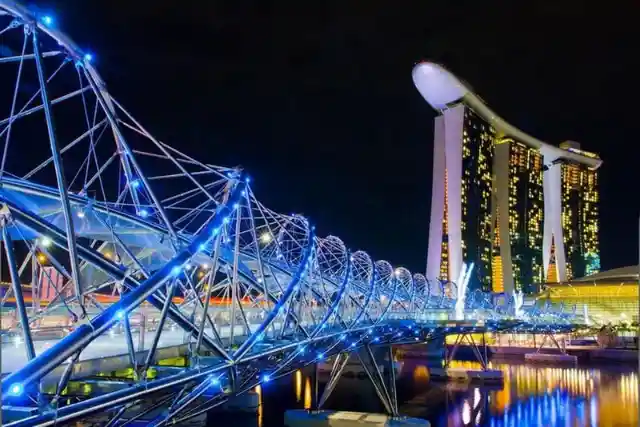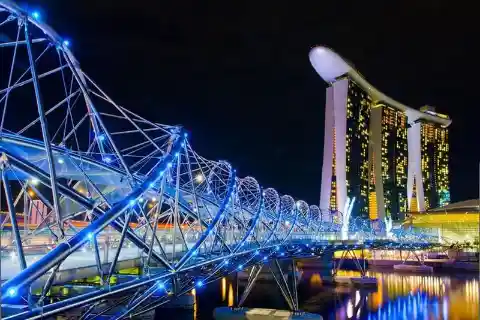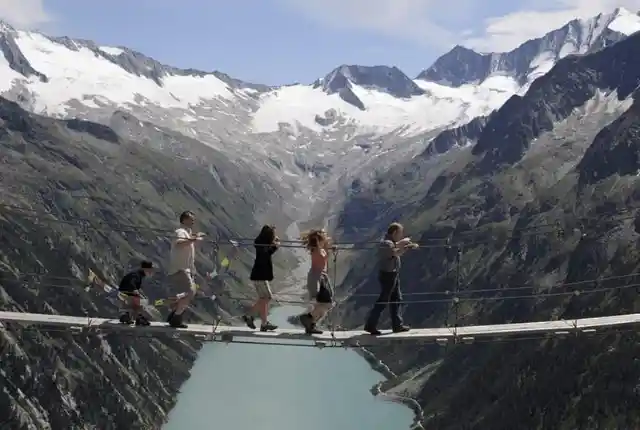
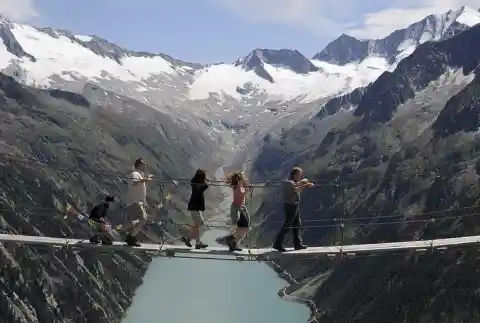
Some bridges are amazing feats of engineering built with some thought about how it looks, how it blends into nature, or the other way around - how it sticks out and shows off human engineering. However, there are other bridges that are dangling obstacles of potential death, made from whatever was on hand at the time. If you have some fear of heights or bridges, you may want to proceed with caution.
We’ve put together a list of the world’s most dangerous and amazing bridges. Let's begin!
Iya Kazurabashi Bridge – Japan

In Tokushima, Japan amazing bridges made of vines cross the Iya Valley’s Iya-gawa River. The Iya Kazurabashi bridge is exceptionally stomach clenching; made of wooden planks interwoven with vines, this may be one bridge too far for even the most adventurous explorer.
See more bridges that would take your breath away (some literally):
Royal Gorge Bridge, Colorado
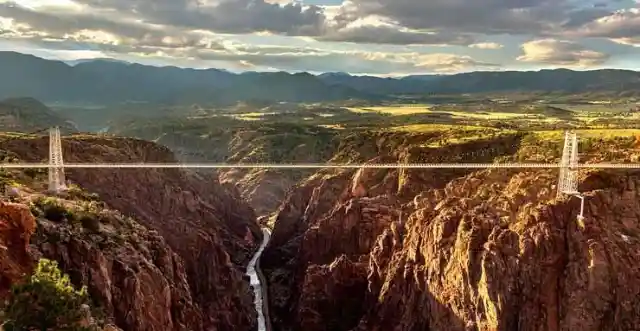
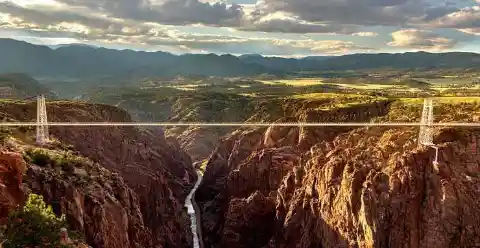
In 1929, the highest suspension bridge in the United States was built in Colorado. The suspension bridge didn’t have suspension cables attached until nearly 50 years later, making for an unsuspended suspension bridge for quite some time.
Longest Sea Bridge, China

A 35 mile (55 km) long sea bridge has been officially opened in October 2018. It's the world’s longest sea bridge and it connects Hong Kong and Macau to the Chinese mainland. There's a part of the roadway which is in a tunnel underwater. So you cross a bridge, drive into a tunnel and back out onto a bridge again. It sounds great, but why is it on this list?
well, it's 35 miles long, without enough pitstops along the way if something happens, but the highlight is the technology used.
The Chinese will be using cameras on the bridge to detect yawning. Even more, drivers on the bridge will be forced to wear heart monitors so they could be tracked along the bridge. That is SCARY.
Hussaini Hanging Bridge, Pakistan
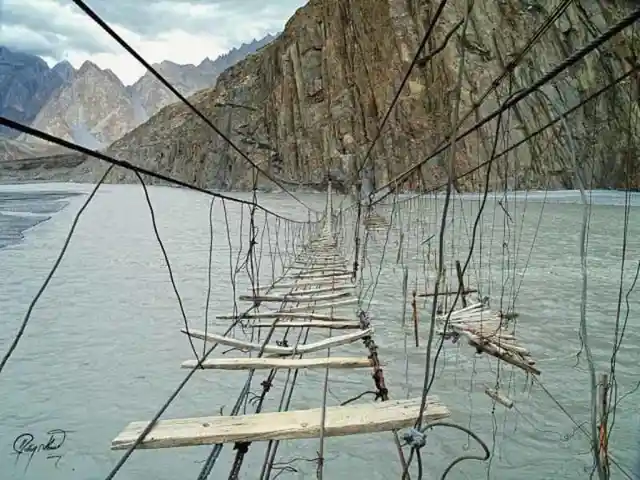
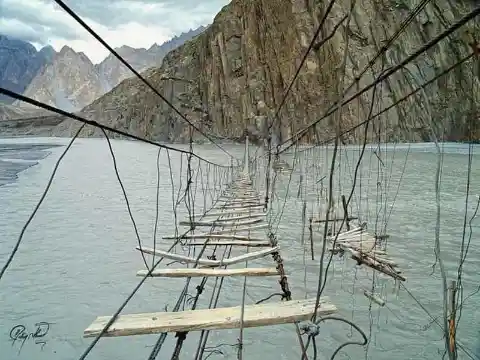
This Hunza River crossing is double jeopardy. If you should slip or misstep, you can meet your ultimate doom either in the raging river below or tangled up in the dangling abandoned bridge right next to the Hussaini Hanging Bridge.
Seven Mile Bridge, Florida

This bridge may seem tame in comparison to some of the others on our list, but the Seven Mile Bridge in Florida, USA is probably frightening during a severe storm or a hurricane. The Seven Mile Bridge is the second to be constructed in Florida; the first sat too close to the water and was blocking boats from crossing under it.
Deception Pass Bridge, Washington State
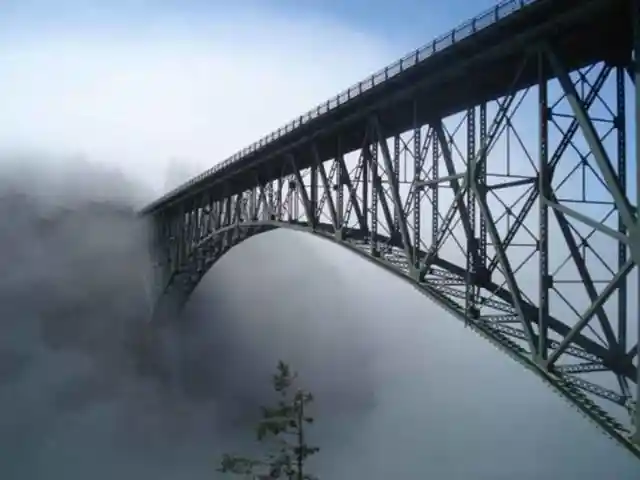
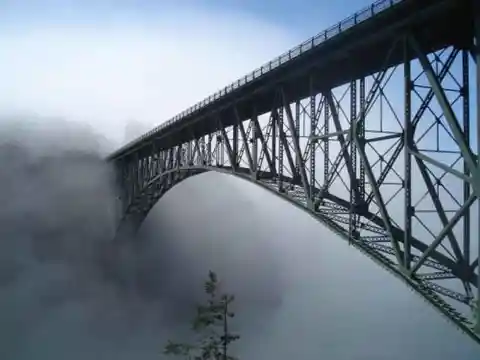
This covered bridge, connecting Whidbey and Fidalgo Islands in Washington State, USA sits a mind-blowing 180 feet above the water below. While this height may make for an uneasy drive across a foggy bridge, the pedestrian lane gives walkers a chance to be terrified, too.
Lake Pontchartrain Causeway, Louisiana

This bridge, built in the 1950’s, was built to connect Metairie and Mandeville. It sits a mere 16 feet above the waves, and once you are on the longest water bridge in the world, there is no turning back.
Canopy Walk, Ghana
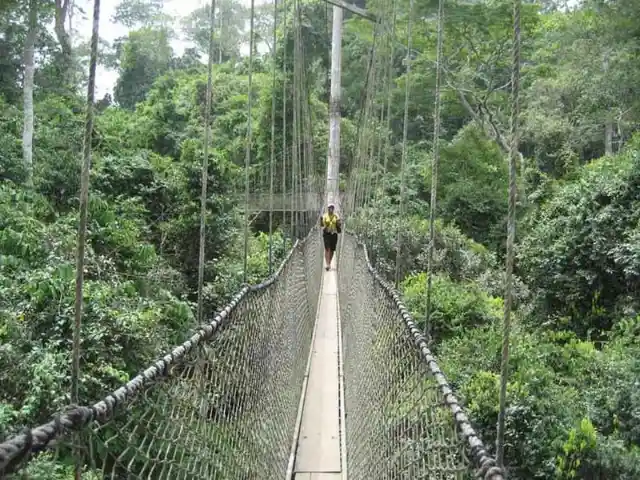
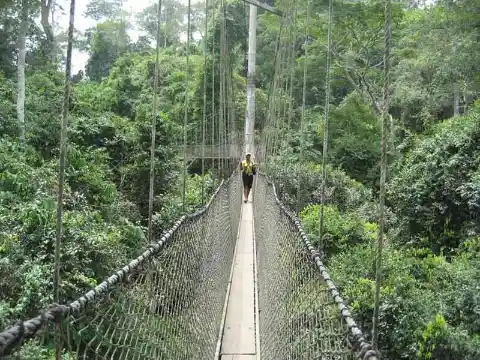
This is a 1,000-foot-long monstrosity that dangles in the air at 40 feet high. Stroll among the trees and see monkeys and birds up close and personally on this rainforest terror bridge.
Langkawi Sky Bridge, Malaysia

This bridge has been closed to maintenance many times, once for two years, and rumor has it the closings are due to fears of collapse. When you’re 400 feet above the ground, you are putting a lot of trust in the maintenance crew.
Mount Titlis, Switzerland
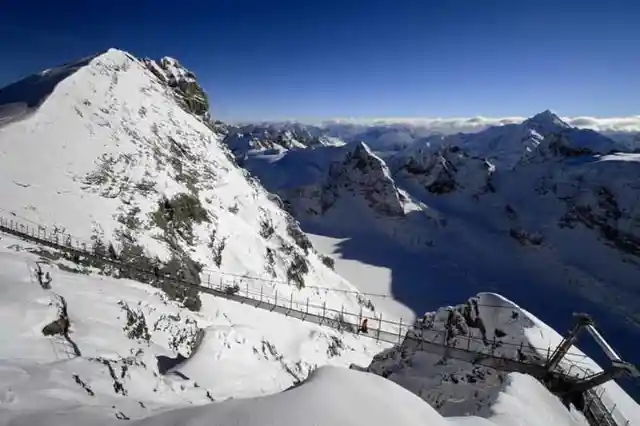
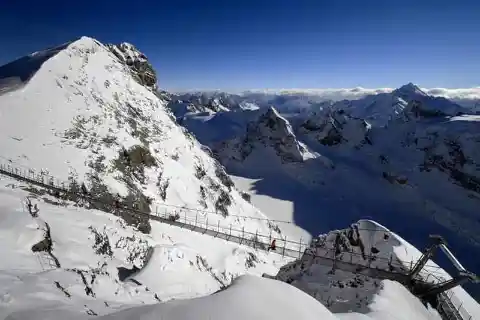
Despite standing 3000 meters above the Swiss Alps, this swaying bridge is used by numerous visitors and ski enthusiasts and is widely considered to be one of the safest bridges in the world.
Vitim River Bridge, Russia

If you’re looking for safe footing and reliable guard rails to cross a rickety bridge, don’t go to this Russian site. The bridge has only been crossed successfully by a very few persons; ice covered surfaces and a lack of any guard rails may deter some, but for others, the lure of adrenaline is too great to be ignored. Many people come to the Siberian bridge to give it a try annually.
Puente de Ojuela, Mexico
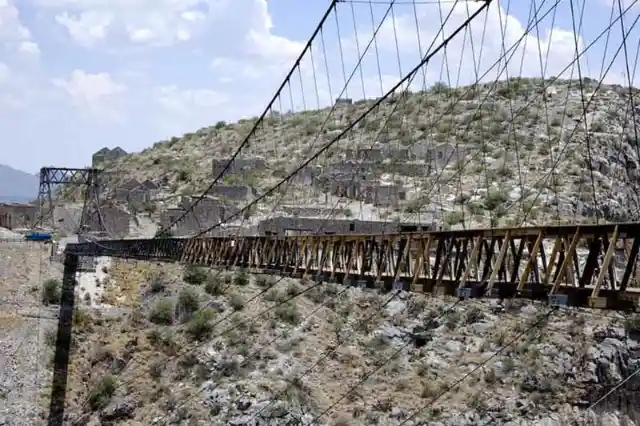
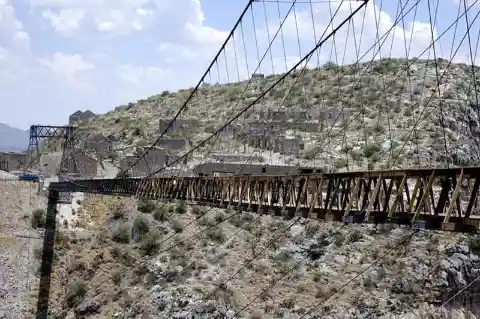
Mexico boasts one of the most dangerous roads on the planet, leading to a pretty unreliable bridge as well. The mining town the bridge spans used to be used regularly but is now limited to pedestrian traffic only. There is a very real risk that a vehicle would not make it across the span at all.
Quepos Bridge, Costa Rica

This bridge is a phobic’s nightmare. Nicknamed “The Bridge of Death,” the Quepos Bridge features planks that don’t meet the borders of the bridge, leaving large holes and gaps on both sides if you should stray from the center of the walkway.
Sunshine Skyway Bridge, Florida
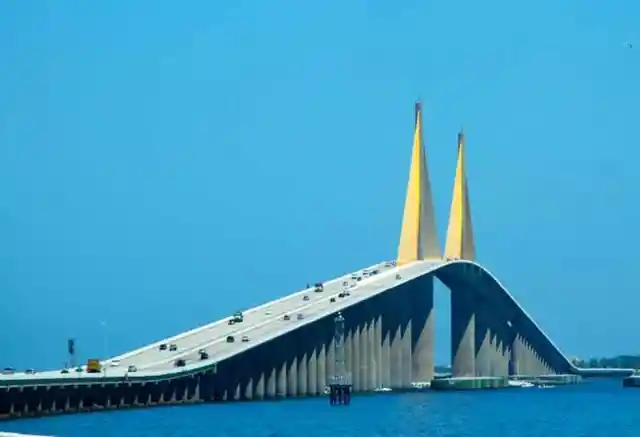
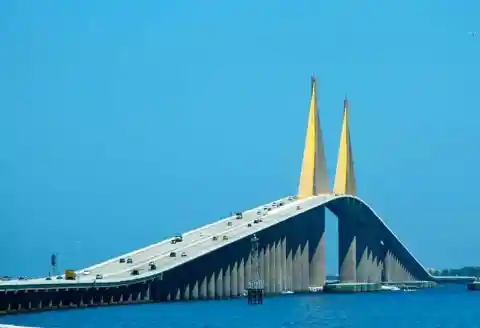
When a huge tanker struck a pier in 1980, 35 people were killed, and the bridge has had a bad reputation ever since. Over 200 people have reportedly committed suicide on this bridge.
Eshima Ohashi Bridge, Japan

This bridge may not be as bad as it looks. It has a height of 144 feet, and a grade of 6.1% making it a little less steep then it seems. It still seems a pretty thrilling climb, though, like some of the most famous roller coasters on the planet.
The Bridge of Immortals, Huang Shang China
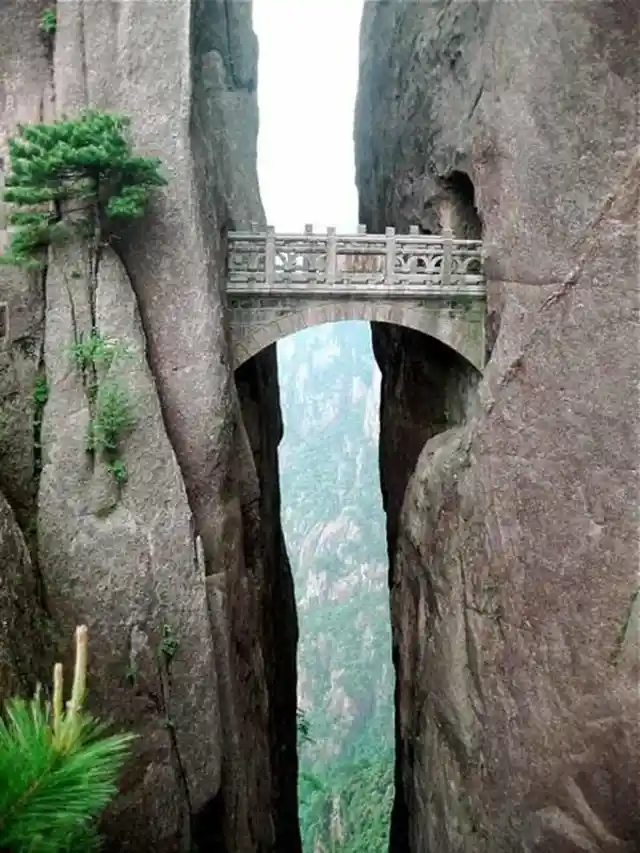
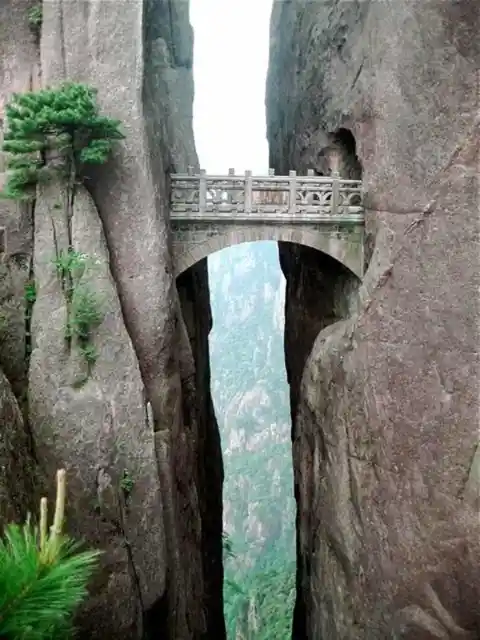
This is a case of the journey being much more frightening than the destination. The trail leading to this bridge is terrifying, but this mountain bridge itself features breathtaking views from high above the clouds.
Montenegro Rainforest, Costa Rica

The rainforest is famous for lush vegetation and an amazing array of wildlife. It is also home to some terrifying bridges, like this one. While it may be thrilling to stroll through the canopies of the trees, don’t pay too much attention to the scenery or you may fall through a missing plank and see the trees from the bottom.
U Bein Bridge, Myanmar
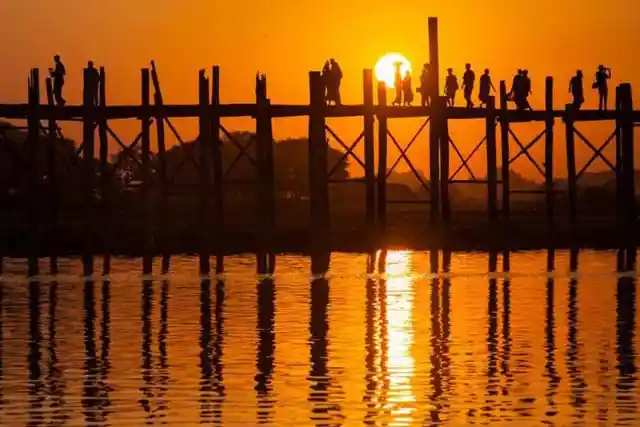
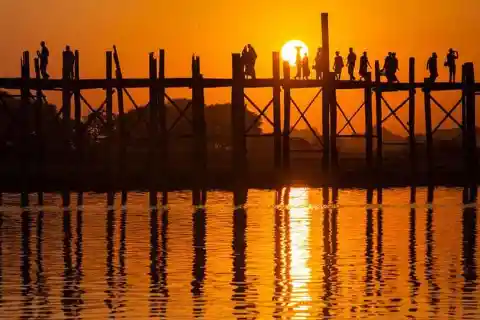
This amazing bridge looks like it’s still being constructed, but this is the way it is supposed to look. The support pillars come straight up through the water creating a bridge that brings numerous tourists to view the one-kilometer spectacle.
Storseisundet Bridge, Norway

Another roller coaster thrill ride that isn’t as scary as it seems, from certain angles this bridge gives the appearance that a driver is about to fall off the edge. The bridge never drops off, thankfully, and is perfectly safe.
Carrick-a-Rede Rope Bridge, Northern Ireland
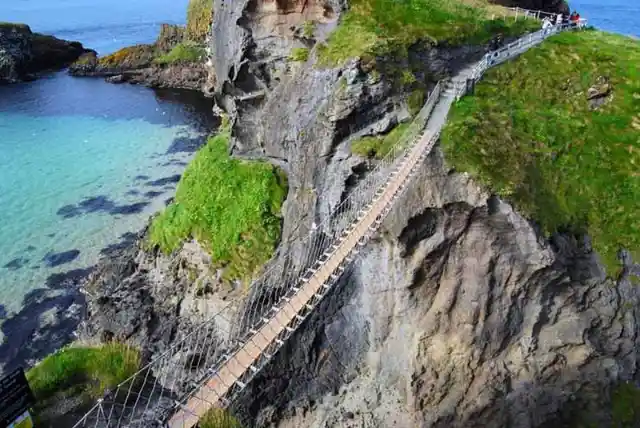
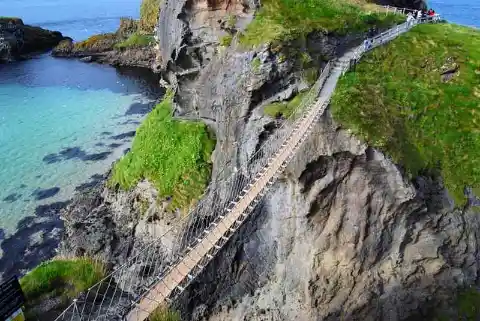
A bridge isn’t much fun if you must pay for the privilege of being terrified. The Carrick-a-Rede Rope Bridge is suspended thirty meters over beaches, water and rocks and is the only thing between people and the beautiful island on the other side. The bridge is so frightening that some people only cross it one way, preferring to ferry back across.
Sidu River Bridge, China

One of the highest bridges in the world is the Sidu River Bridge, connecting Chongqing to Shanghai. This bridge was constructed in 2009 for a cost of $100 million USD. One of the sturdiest steel bridges ever constructed, it boasts amazing views of the valley far below.
Mekong River Crossing – China
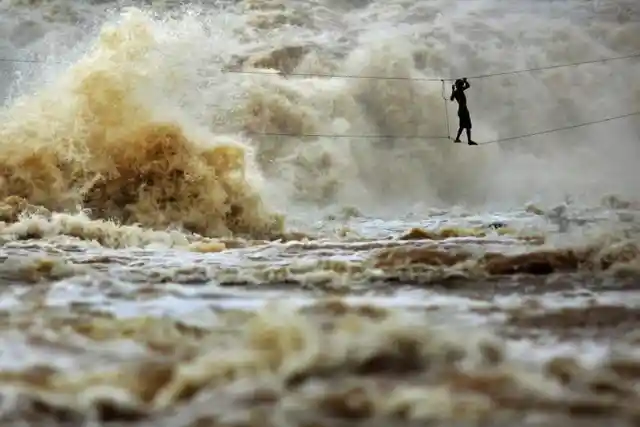
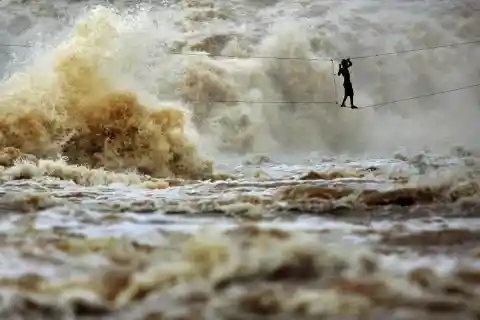
The Mekong River winds its way through six Southeast Asian countries: Burma, Thailand, Cambodia, Laos, China and Vietnam. The waters of this river can be very still and calm or raging rapids depending on where you are along the water’s edge. This local seems to be a highly skilled slack-liner in this photo snapped right after a severe storm; one misstep and he would fall into those angry waters below.
Millau Viaduct – France

The cable stayed Millau Viaduct is one of the tallest bridges in the world. Standing 1,125 feet above the base, this bridge crosses the Gorge Valley in Southern France. Some more staggering stats? The bridge is 105 feet wide, and 8,000 feet long. The Millau Viaduct received the International Association for Bridge and Structural Engineering award for Outstanding Structure in 2006. Amazingly, the construction which began in 2001 was finished inside of three years. It is considered an amazing feat of engineering.
Mystery Bridge – Indonesia
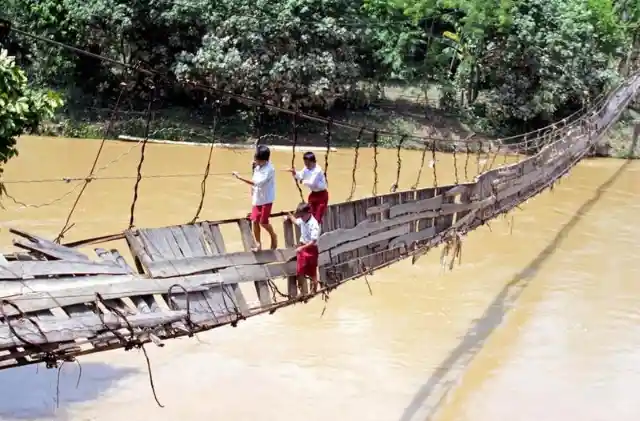

Gymnastics requires incredible dedication, concentration, balance and elegance. While these school children crossing this rickety bridge probably aren’t gymnasts, it would help.
Trift Bridge – Switzerland

In 2004, this amazing 558-foot bridge was constructed to span the glaciers of the Swiss Alps. The Trift suspension bridge towers 328 above sea level near Gadman in Switzerland and wasn’t always a suspension bridge. Pedestrians who crossed the bridge in its early years noted that it had a rather unsettling way of swaying in the wind, sometimes quite violently. In 2009, this problem was solved by the placement of stabilizing cables.
Hanging Bridge Of Ghasa – Nepal
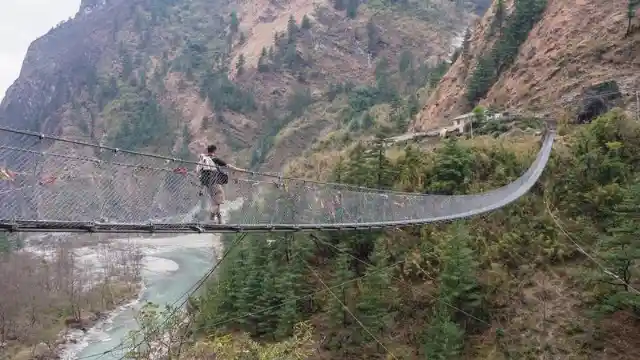
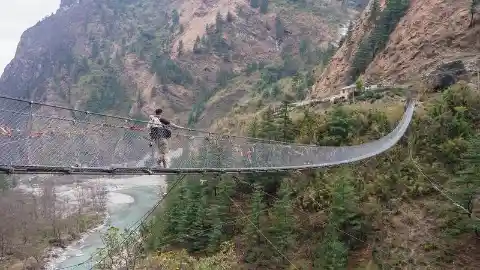
It’s not enough that humans choose to cross this swaying bridge in the wind and rain, they also drag unsuspecting cattle, donkeys or other four-legged critters along the bridge with them. The Hanging Bridge of Ghasa is suspended far above the river valley below, so thankfully there are high side rails to offer some protection along the crossing.
U Bein Bridge – Burma

This bridge is dangerous for two reasons. First, the bridge itself offers no hand rails or support at all. Secondly, the bridge has become a regular den of thieves over recent years, requiring a small police force to stand guard and protect tourists. The bridge crosses the Taungthaman Lake in Burma and is around three quarters of a mile in length. The bridge was constructed in 1850 using teak, a tropical hardwood.
Root Bridges – India
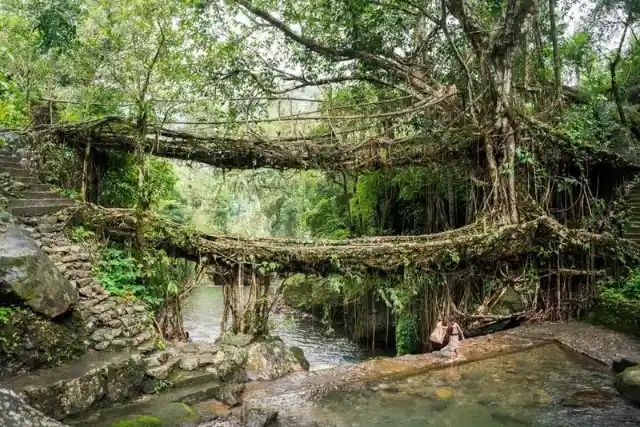
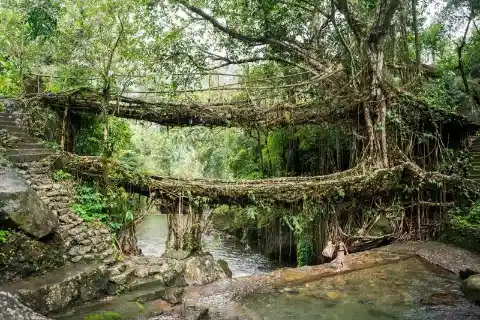
Proving that nature can be a little terrifying, consider these bridges made entirely of naturally growing tree roots. The Ficus Elastica grows in Jaintia and southern Khasi hills and creates a complex network of roots projecting out from the upper areas of the tree trunk. Local tribes in the area, such as the War-Jaintias and War-Khasis, have trained these roots to grow in such a manner that they create these amazing paths and bridges through the forest and over rivers.
Taman Negara Canopy Walkway – Malaysia

With a span of over 1,700 feet, the Taman Negara Canopy walkway is the longest suspension footbridge in the world. The amazing 130-foot bridge is a popular tourist attraction for those daring spirits from across the globe who wish to challenge fate.
Daedunsan Mountain Suspension Bridge – South Korea
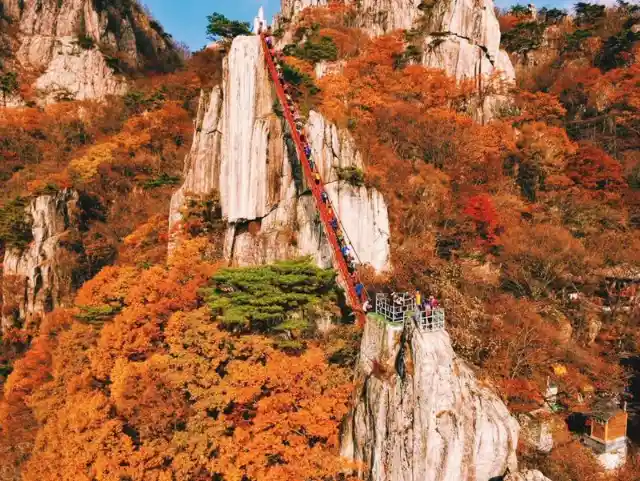
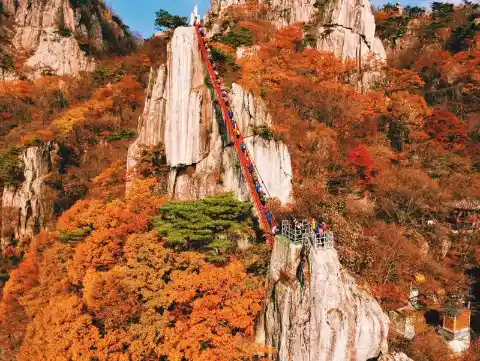
The gorgeous views from this 50-meter-long bridge is the reward after an equally beautiful scenic hike to find it. The bridge offers amazing views of the deep gorge below it.
Keshwa Chaca Bridge – Peru

It’s not only that this bridge is made entirely of woven grass, it’s the fact that the bridge was created from the grasses by the Incas, 500 years ago. Incan women were responsible for braiding the long, thin ropes that were then braided into thicker, stronger support cables. This amazing structure is one of the few fascinating glimpses still available into the past of the mysterious Incas and continues to hold strong to this day.
Longjiang Suspension Bridge – China
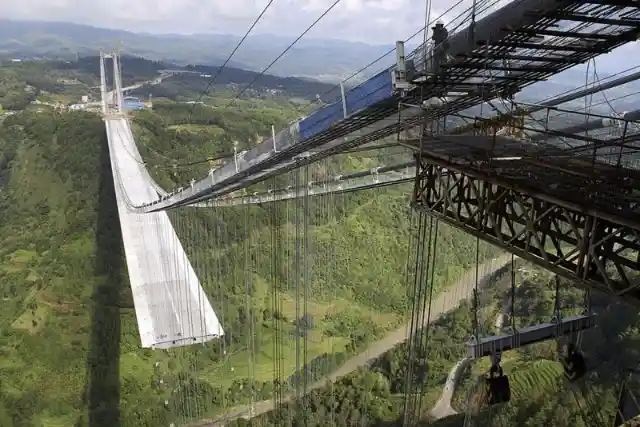
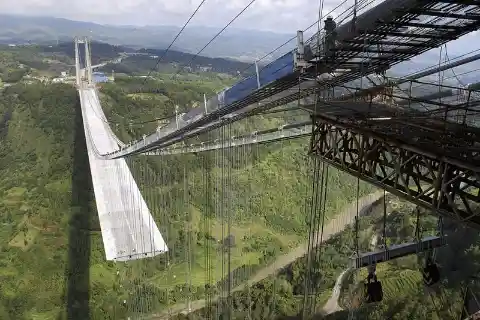
Proving the theory that the quickest way between two points is a straight line, this Baoshan, Yunnan suspension bridge in China was built to span Baoshan and Tengchon, bypassing an 8.4-mile detour. The Longjiang Bridge is one of the longest bridges ever constructed with a 3,900-foot span, it’s also one of the tallest bridges ever built at 920 feet over the Long River. The bridge was built in 2016.
Capilano Suspension Bridge – Canada

While the Capilano Suspension Bridge in Canada was originally constructed in 1889 by Scottish civil engineer George Grant McKay, it was sold twice before being bought by Henri Auvenwau who renovated it in the 1950s. This bridge in Northern Vancouver is a pedestrian only bridge spanning 460 feet in length and towering 230 feet above the river. Nearly 800,000 people visit the bridge annually.
Ai Petri Bridge – Ukraine
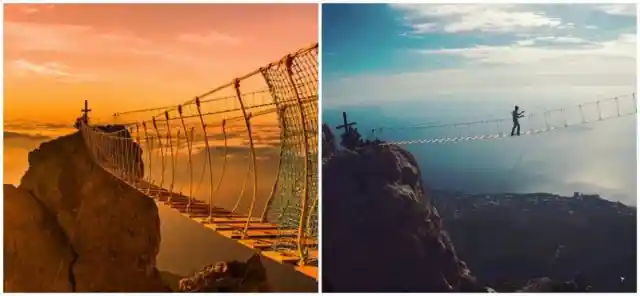
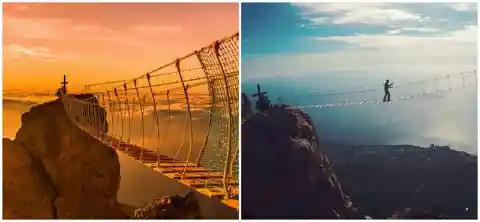
This bridge can be found inviting daredevils and adrenaline junkies to cross it in the mountains of the Ukraine. It is a footbridge that spans a 4,200-foot-deep canyon. The bridge is prone to the wind and fog of the area, and visitors claim that even if the wind is not blowing hard the bridge sways threateningly as they traverse the span that connects two Crimean Mountains at their peak.
Suspension Glass Bridge – China

Now available for the truly brave, China presents a glass bottom bridge that overlooks a 984-foot drop. Located in China’s Shiniuzhai National Geographic Park, this bridge spans two mountains and is 1,410 feet. When the bridge was opened, it needed to be shut down due to the heavier than anticipated foot traffic; while the original allotment was 8,000 visitors per day, nearly 80,000 visitors were crossing it daily.
Plank Road in the Sky – China
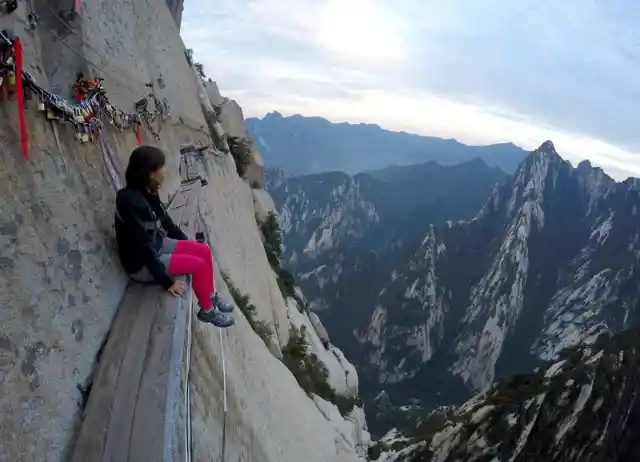
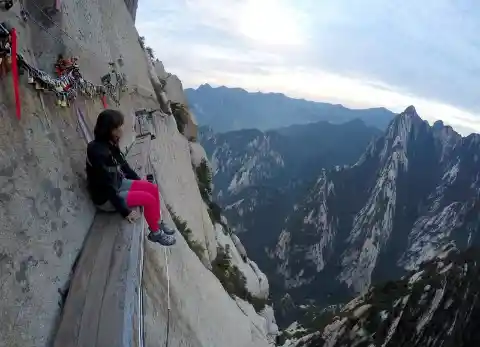
What if you were suspended 7,000 feet above the mountains by a harness, and the only way to pass someone crossing it the other way was to unhook your harness? Welcome to the Plank Road in the Sky on Mount Hua in China. The bridge is made of wooden planks, and to keep from plunging to an early demise you are attached to a rope spanning the bridge.
Cape William Moore Bridge – Alaska

The Alaskan Cape William Moore Bridge has seen more than its fair share of heavy trucks laden with ore crossing it, resulting in a general weakening of the bridge. Built in 1976, this bridge is due to be replaced because it tends to bend as you traverse it.
Marienbruecke – Germany
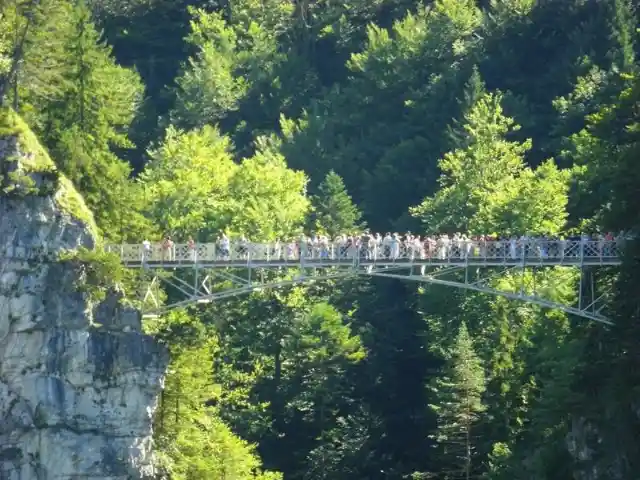
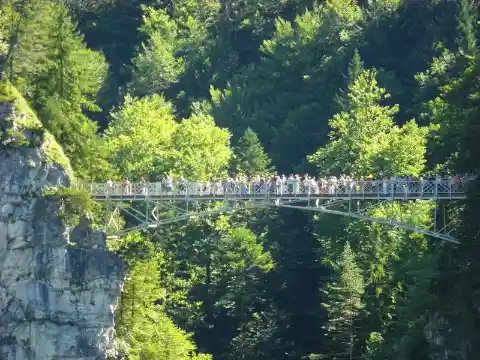
This bridge, constructed in 1840, was a gift from the Crown Prince Maximillian to Marie, his mountain climbing buddy. It offers beautiful views of the mountains as well as somewhat disturbing visuals of the deep gorge it crosses.
Mackinac Bridge – Michigan

With the dubious honor of being named one of the most dangerous bridges in the United States, Mackinac Bridge offers the unique opportunity to be blown, car and all, directly off it in heavy winds. Many people are, with good reason, wary of this bridge and choose to ferry across instead.
Musou Tsuribashi Bridge – Japan
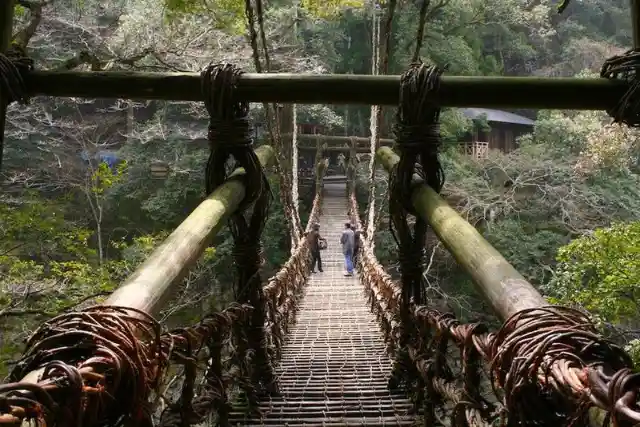
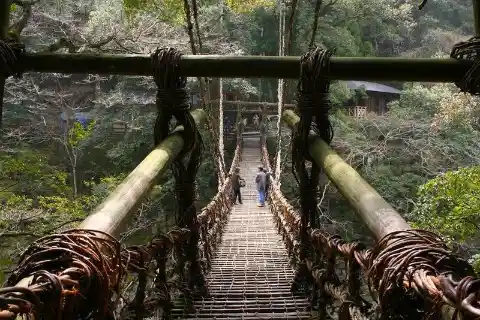
“Constructed” may not exactly be the term to describe this bridge’s creation; in the 1950’s, someone grabbed a wire and some wooden planks to create this very narrow, rickety “bridge” in Japan.
William Preston Lane Bridge – Maryland

A bridge nearly 186 feet high with a length of almost five miles is nothing to scoff at to begin with, but this Maryland, USA bridge also adds a splattering of unreliability during severe storms. Visibility is lessened to about zero in some stormy situations.
Kawarau Bridge – New Zealand
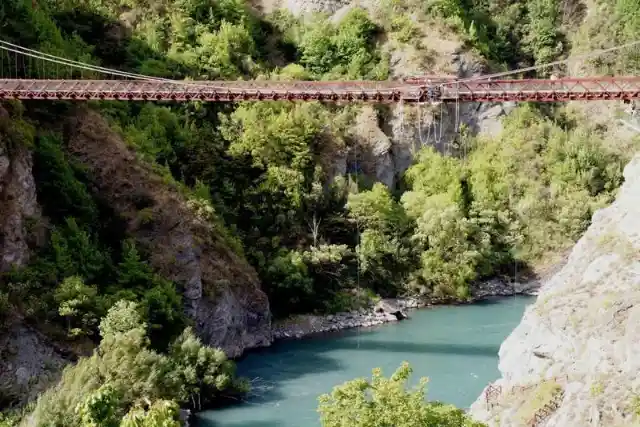
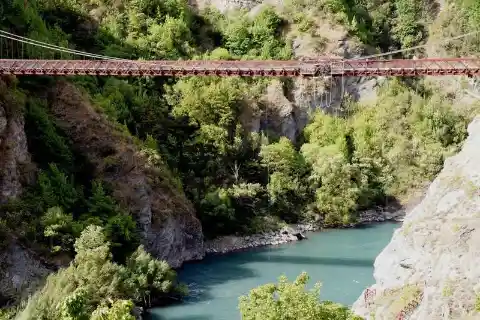
A bungee jumper’s paradise, the Kawarau Bridge in Mew Zealand sits 43 meters above the river and features breathtaking views of Queenstown.
Moses Bridge, Netherlands

Adjustable dams give the Moses Bridge a unique optical illusion; it looks as if the waters were parted ala Moses. The bridge was once a moat surrounding a Dutch fortress and is currently in use as a “sunken” bridge. Made from waterproof wood, the bridge is a biblical Old Testament miracle come to life.
Henderson Waves – Singapore


The Henderson Waves pedestrian bridge is Singapore’s tallest, and connects two parks. The bridge winds snake-like through a series of amazingly complex steel ribs and waves and offers amazing views for tourists.
Mur Island Bridge – Austria

This bridge was originally constructed to pay temporary homage to the appointment of the city of Graz, Austria as the European Capital of Culture in 2003. The pedestrian only bridge was wildly popular among tourists and locals alike, so the city elected to keep this bridge. The Mur Island Bridge connects both ends of Graz.
Pont de Singe – England
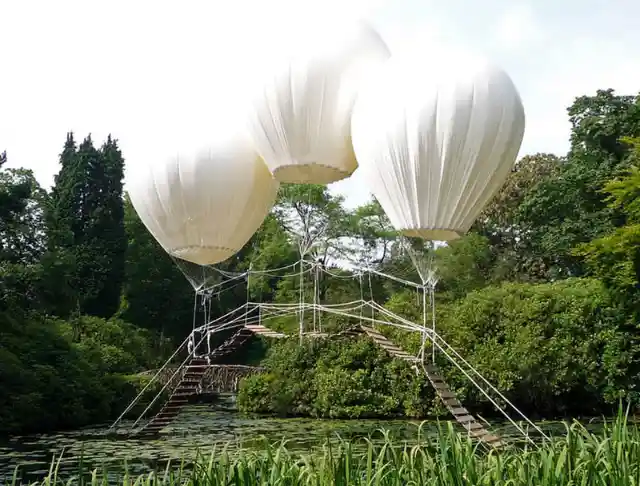
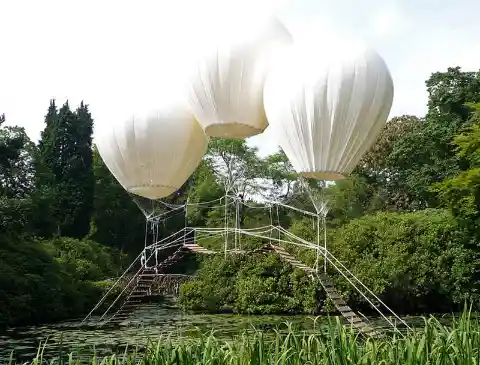
A unique bridge that is self-limiting due to the nature of its construction, this bridge was built by a French artist for Tatton Park’s 2012 Biennial celebration. The bridge is suspended by three helium balloons and can be used by only one pedestrian at a time.
Rakotzbrücke Devil’s Bridge – Germany

The Rakotzbrucke is one of several European bridges known as the Devil’s Bridges due to the amazing masonry work that only a Devil could design. This one can be found in Saxony, Germany.
Confederation Bridge – New Brunswick
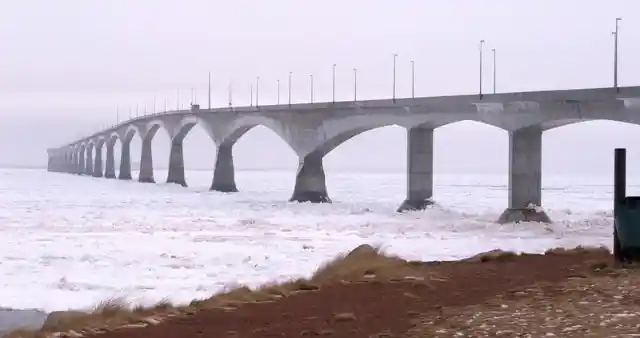
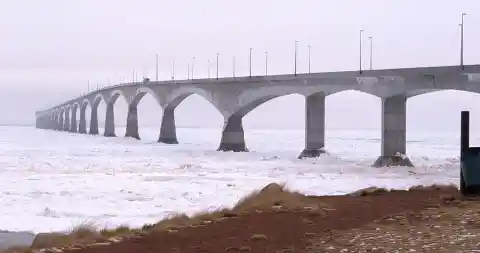
This bridge was built at a cost of C$1.3 billion and took five thousand workers over four years to complete. It is an amazing Canadian feat of engineering and is the longest ice-water crossing bridge in the world. This bridge is the only link connecting Prince Edward Island and New Brunswick.
Ponte Vasco da Gama – Lisbon

Crossing the Tagus estuary and bypassing Lisbon, this bridge is the longest bridge in Europe at 7.67 miles in length. The cable suspended portion of the Ponte Vasco da Gama is 1,378 feet. The entire bridge was engineered to withstand a large earthquake and is expected to last for 120 years.
Pont du Gard – France
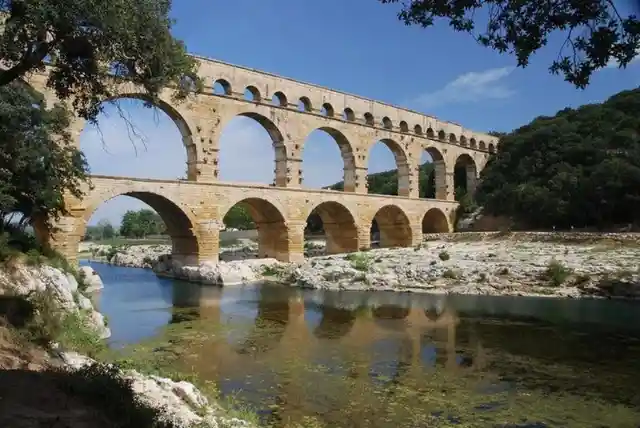
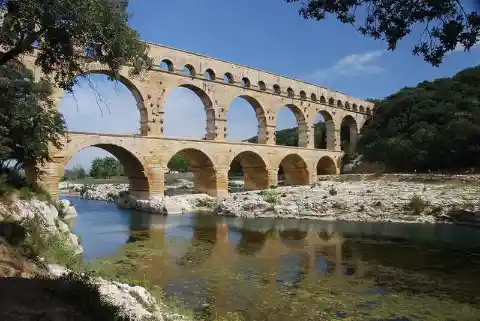
This aqueduct turned roadway moved 200,000 cubic meters of water along its 1/3000 graded structure to a length of 902 feet. Built between 40 and 60CE, it was still in use as an aqueduct until the sixth century. The Pont du Gard is the highest Roman aqueduct at 164 feet and is constructed over the Gard River.
Kintai Bridge – Japan

Kintai, meaning “gold brocade sash,” dates to 1673 and is made from solid woods such as pine, chestnut, Japanese zelkova, cypress, and oak. The original arches, floating upwards from stone piers, were washed away in 1950 and had to be rebuilt.
Slaters’ Bridge – Cumbria
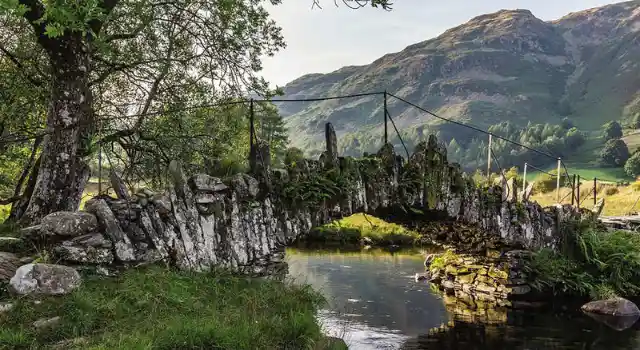
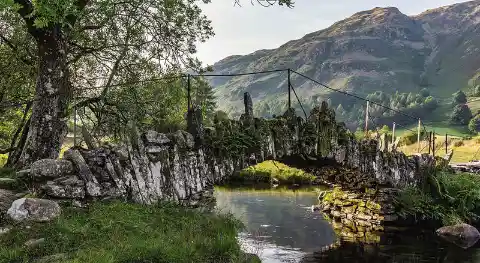
The Slater’s Bridge in Cumbria was constructed some time in the late 18th century for pack-horses to carry slates from quarries located in the hills. It features arch and slab construction, with the voussoirs (arch stones) an amazing 4.3 feet long. The very narrow bridge, only 4.2 feet across, meant horses and people alike needed to tread very carefully during the crossing.
Aqueduct de los Milagros – Spain

Another Roman aqueduct turned road, the Aqueduct de los Milagros supplied the Roman city of Emerita Augusta with water. Built around 100CE during Trajan’s reign, the aqueduct crossed the Albarregas River in Spain. Currently a favorite nesting spot for storks, the Aqueduct de los Milagros is 98.5 feet high with the longest span between piers being 14.8 feet.
Carioca Aqueduct – Rio de Janeiro
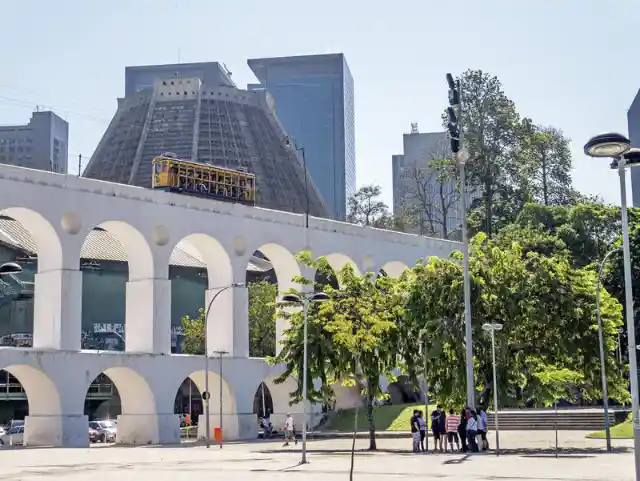
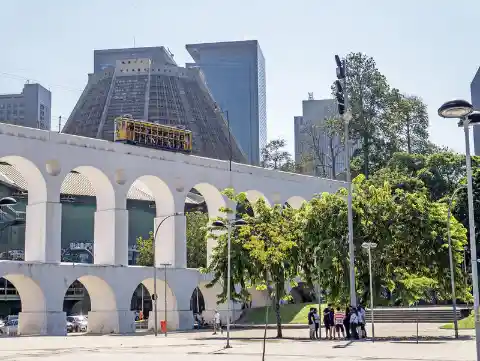
In 1723, the Arcos da Lapa (the Carioca Aqueduct) in Rio de Janeiro was originally a part of the city’s water supply system. In 1750, the Arcos da Lapa was inaugurated. The military style structure spans 886 feet, reaching a height of 57.7 feet. In the 1890’s the Arcos da Lapa was no longer needed, but it was given a new life as the Santa Teresa Tramline conduit.
Monkey bridges, Vietnam

When in the Mekong Delta locals must cross whenever and however they can. These bridges are called monkey bridges, not only because it looks as though the only one who could cross would be a monkey but also because of the strange monkey-like stance taken by the locals to maintain their balance.
Bhumibol Bridges – Bangkok
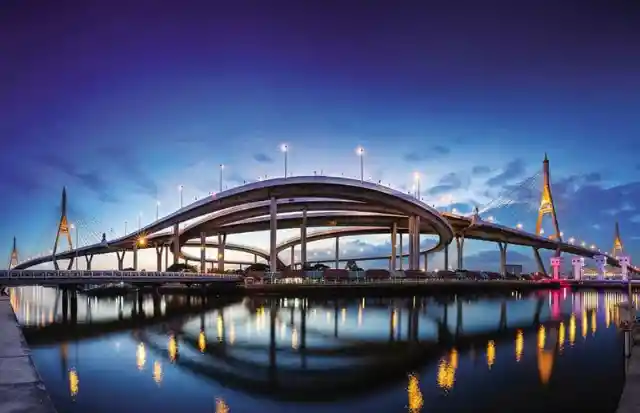
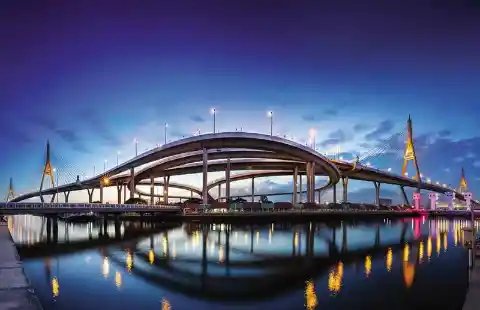
Above the Chao Phraya River is a multi-level spiral interchange found between the two Bhumibol Bridges. This structure, located south of Bangkok, links the western approach over the bridges with the north-south route. They are both identical in design, featuring elongated diamond shaped concrete towers and reaching 164 feet in height.
Baliem River Bridge – Western New Guinea

Baliem Valley in Western New Guinea features a stomach-churning bridge made of primitive building materials loosely following some engineering designs as set forth by other bridge construction plans. The haphazard design attempt is where the similarities stop, however, and the rushing, foaming rapids below are intimidating enough to keep most travelers away, unless they want to become very wet, very quickly.
Ponte Vecchio, Italy
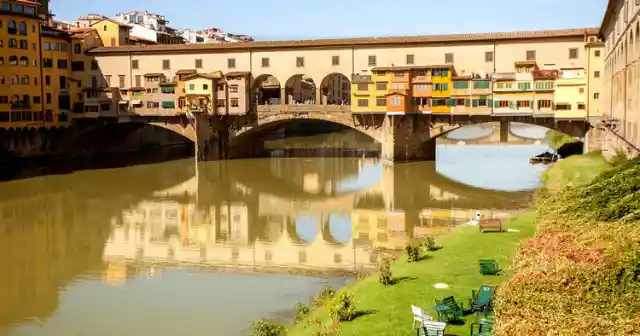
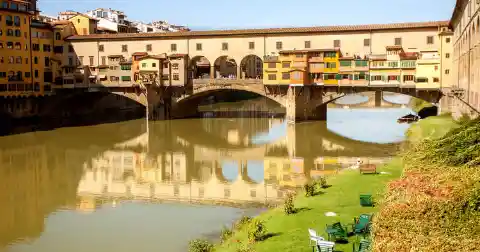
The Ponte Vecchio means "Old Bridge" in Italian and spans the Arno river at its narrowest point. It is believed that the bridge was first built in Roman times and first appears in a document in the year 996. The bridge consists of three segmental arches is renown for always having hosted shops and merchants who displayed their goods on tables before their premises.
It is believed the economic concept of bankruptcy originated here when a money-changer could not pay his debts, the table on which he sold his wares (the "banco") was physically broken ("rotto") by soldiers, and this practice was called "bancorotto" (broken table). Not having a table anymore, the merchant was not able to sell anything.
Magdeburg Water Bridge, Germany

The Magdeburg Water Bridge connects Berlin’s inland harbor network with the ports along the Rhine River. It is the largest canal underbridge in Europe and spans the river Elbe which allows commercial ships to pass the Rhineland and Berlin without needing to descend and ascending out of the Elbe itself. The bridge measures 3,012 feet (918 meters) in length.
Helix Bridge, Singapore
